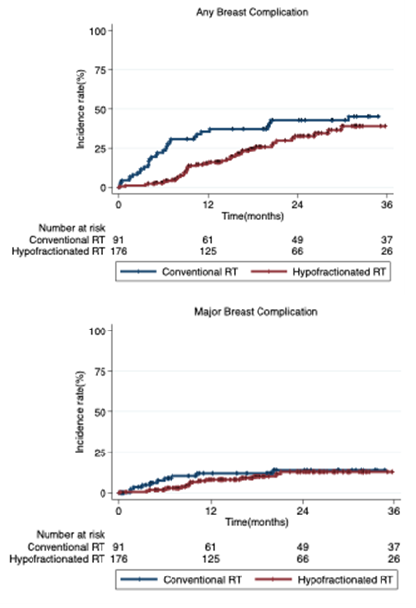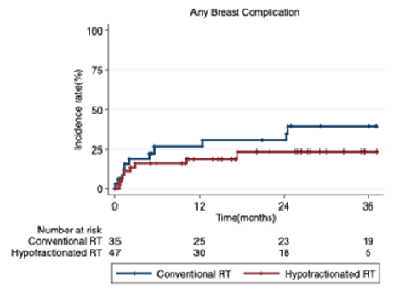글로벌 연구동향
방사선종양학
- [Breast.] Hypofractionated versus conventional fractionated radiotherapy for breast cancer in patients with reconstructed breast: Toxicity analysis
서울의대 / 김동연, 김인아*
- 출처
- Breast.
- 등재일
- 2021 Feb
- 저널이슈번호
- 55:37-44. doi: 10.1016/j.breast.2020.11.020. Epub 2020 Dec 1.
- 내용
Abstract
Purpose: This study investigated whether hypofractionated adjuvant radiotherapy (RT) increased breast-related complication(s) compared to conventional fractionated RT in reconstructed breast cancer patients.Methods: We conducted a retrospective review including 349 breast cancer patients who underwent immediate breast reconstruction following mastectomy or breast-conserving surgery (BCS) between 2009 and 2018 at two institutions. All patients were treated with adjuvant RT via either a conventional fractionated or hypofractionated regimen. We defined a major breast complication as a breast-related toxic event requiring re-operation or re-hospitalization during the follow-up period after the end of RT.
Results: The median follow-up was 32.3 months (4.8-118.5 months); 126 patients had conventional fractionated RT, and 223 patients received hypofractionated RT. In patients with mastectomy, there was no significant difference in the occurrence of any or major breast-related complications between the two fractionation regimens. In patients undergoing BCS, incidence of any breast complication showed no difference between two RT groups and no major breast complication was reported as well. Hypofractionated RT did not increase major wound problem (infection and dehiscence) compared to conventional RT. Incidence of major contracture was significantly lower in hypofractionated RT.
Conclusions: There was no significant difference in the occurrence of any or major breast-related complications between the two different fractionation regimens, even in patients with mastectomy. Hypofractionated RT may be used comparable to conventional fractionated RT in terms of breast-related complications in reconstructed breast cancer patients. The prospective randomized trial would be necessary to clarify this issue.

Fig 1
유방전절제술을 받은 환자에서, 방사선 치료 분획에 따라 any breast complication의 발생에 유의한 차이가 없었고 (P=0.064), any breast complication 중 재입원 혹은 재수술이 필요했던 Major breast complication의 발생 또한 유의한 차이가 없었다 (P=0.420).

Fig 2
유방보존술을 받은 환자에서, 방사선 치료 분획에 따라 any breast complication 발생에 유의한 차이가 없었다 (P=0.301). 유방보존술을 받은 경우 major breast complication의 발생은 없었다.
Affiliations
Dong-Yun Kim 1 , Eonju Park 2 , Chan Yeong Heo 2 , Ung Sik Jin 2 , Eun Kyu Kim 3 , Wonshik Han 4 , Kyung Hwan Shin 1 , In Ah Kim 5
1 Department of Radiation Oncology, Seoul National University College of Medicine, Seoul, Republic of Korea.
2 Department of Plastic and Reconstructive Surgery, Seoul National University College of Medicine, Seoul, Republic of Korea.
3 Department of Surgery, Seoul National University College of Medicine, Seoul, Republic of Korea.
4 Department of Surgery, Seoul National University College of Medicine, Seoul, Republic of Korea; Cancer Research Institute, Seoul National University, College of Medicine, Seoul, Republic of Korea.
5 Department of Radiation Oncology, Seoul National University College of Medicine, Seoul, Republic of Korea; Cancer Research Institute, Seoul National University, College of Medicine, Seoul, Republic of Korea; Department of Radiation Oncology, Seoul National University Bundang Hospital, Seongnam, Republic of Korea. Electronic address: inah228@snu.ac.kr.
- 키워드
- Breast cancer; Hypofractionation; Radiotherapy; Reconstruction.
- 연구소개
- 유방암 환자에서 수술 후 미용적 만족과 심리적 완화를 목적으로 유방재건술의 시행이 늘어나고 있습니다. 방사선 치료는 유방재건술의 결과에 영향을 주는 것으로 알려져 있는데, 그 중 저분획 방사선치료가 기존의 통상분획 방사선치료와 비교하여 부작용에 어떠한 영향을 주는지 밝혀진 바가 거의 없습니다. 본 연구는 유방전절제술 혹은 유방보존술 후에 보조적 방사선 치료를 받고 즉시 유방 재건술을 받은 349명의 환자들을 대상으로 저분획과 통상분획 방사선 치료의 부작용을 비교하였습니다. 유방전절제술 (Figure 1A, 1B)과 유방보존술 (Figure 2) 두 경우에서 모두 방사선치료의 분획에 따라 유방 관련 부작용의 차이를 확인할 수 없었습니다. 특히, 저분획 방사선치료는 수술이나 재입원이 필요한 주요한 상처문제를 (감염과 벌어짐) 증가시키지 않았으며, 주요한 구형 구축 발생은 유의하게 낮추는 것으로 확인되었습니다. 본 연구 결과는 실제 임상에서 유방재건술을 시행한 환자에게 저분획 방사선치료를 선택하는데 도움이 될 수 있을 것이며, 향후 계획 중인 전향적 무작위 연구를 통해 입증이 필요할 것으로 사료됩니다.
- 덧글달기
- 이전글 [Clin Breast Cancer.] Spontaneous Rib Fractures After Breast Cancer Treatment Based on Bone Scans: Comparison Of Conventional Versus Hypofractionated Radiotherapy
- 다음글 [Breast.] Outcome of radiotherapy for clinically overt metastasis to the internal mammary lymph node in patients receiving neoadjuvant chemotherapy and breast cancer surgery










편집위원
유방재건술 후 방사선치료 시 통상분할방사선치료와 소분할방사선치료의 부작용을 비교하였을 때 유의한 차이가 없었음
2021-03-25 14:55:45